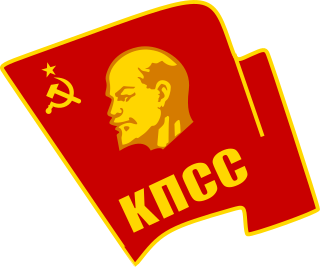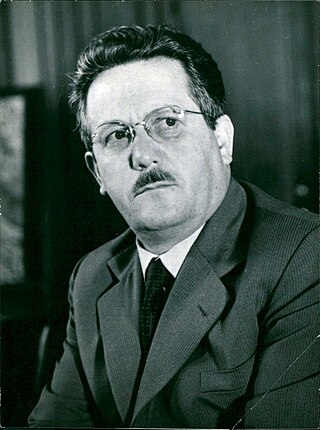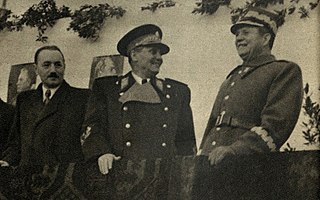
The Communist Party of the Soviet Union (CPSU), at some points known as the Russian Communist Party, All-Union Communist Party and Bolshevik Party, and sometimes referred to as the Soviet Communist Party (SCP), was the founding and ruling political party of the Soviet Union. The CPSU was the sole governing party of the Soviet Union until 1990 when the Congress of People's Deputies modified Article 6 of the 1977 Soviet Constitution, which had previously granted the CPSU a monopoly over the political system. The party's main ideology was Marxism-Leninism.

Josip Broz, commonly known as Tito, was a Yugoslav communist revolutionary and politician who served in various positions of national leadership from 1943 until his death in 1980. During World War II, he was the leader of the Yugoslav Partisans, often regarded as the most effective resistance movement in German-occupied Europe. He also served as prime minister from 2 November 1944 to 29 June 1963 and president of the Socialist Federal Republic of Yugoslavia from 14 January 1953 until his death. His political ideology and policies are collectively known as Titoism.
Marxism–Leninism is a communist ideology that became the largest faction of the communist movement in the world in the years following the October Revolution. It was the predominant ideology of most socialist governments throughout the 20th century. Developed in Russia by the Bolsheviks, it was the state ideology of the Soviet Union, Soviet satellite states in the Eastern Bloc, and various countries in the Non-Aligned Movement and Third World during the Cold War, as well as the Communist International after Bolshevization.

Edvard Kardelj, also known by the pseudonyms Bevc, Sperans, and Krištof, was a Yugoslav politician and economist. He was one of the leading members of the Communist Party of Slovenia before World War II. During the war, Kardelj was one of the leaders of the Liberation Front of the Slovenian People and a Slovene Partisan. After the war, he was a federal political leader in the Socialist Federal Republic of Yugoslavia. He led the Yugoslav delegation in peace talks with Italy over the border dispute in the Julian March.
New class is a polemic term by critics of countries that followed the Soviet-type state socialism to describe the privileged ruling class of bureaucrats and Communist party functionaries which arose in these states. Generally, the group known in the Soviet Union as the nomenklatura conforms to the theory of the new class. The term was earlier applied to other emerging strata of the society. Milovan Đilas' new-class theory was also used extensively by anti-communist commentators in the Western world in their criticism of the Communist states during the Cold War.

The Socialist Federal Republic of Yugoslavia (SFRY), commonly referred to as SFR Yugoslavia or Socialist Yugoslavia or simply as Yugoslavia, was a country in Central and Southeast Europe. It emerged in 1945, following World War II, and lasted until 1992, with the breakup of Yugoslavia occurring as a consequence of the Yugoslav Wars. Spanning an area of 255,804 square kilometres (98,766 sq mi) in the Balkans, Yugoslavia was bordered by the Adriatic Sea and Italy to the west, by Austria and Hungary to the north, by Bulgaria and Romania to the east, and by Albania and Greece to the south. It was a one-party socialist state and federation governed by the League of Communists of Yugoslavia, and had six constituent republics: Bosnia and Herzegovina, Croatia, Macedonia, Montenegro, Serbia, and Slovenia. Within Serbia was the Yugoslav capital city of Belgrade as well as two autonomous Yugoslav provinces: Kosovo and Vojvodina.

Titoism is a socialist political philosophy most closely associated with Josip Broz Tito during the Cold War. It is characterized by a broad Yugoslav identity, socialist workers' self-management, a political separation from the Soviet Union, and leadership in the Non-Aligned Movement.

The Informbiro period was an era of Yugoslavia's history following the Tito–Stalin split in mid-1948 that lasted until the country's partial rapprochement with the Soviet Union in 1955 with the signing of the Belgrade declaration. After World War II in Yugoslavia, Yugoslavia's new leadership under Josip Broz Tito pursued a foreign policy that did not align with the Eastern Bloc. Eventually, this led to public conflict, but the Yugoslav leadership decided not to acquiesce to Soviet demands, despite significant external and internal pressures. The period saw the persecution of the political opposition in Yugoslavia, resulting in thousands being imprisoned, exiled, or sent to forced labour. 100 Yugoslav citizens were seriously wounded or killed between 1948 and 1953 while some sources claim 400 victims during the existence of Goli otok prison camp. The purges included a significant number of members of Yugoslavia's security apparatus and its military.

Milovan Djilas was a Yugoslav communist politician, theorist and author. He was a key figure in the Partisan movement during World War II, as well as in the post-war government. A self-identified democratic socialist, Djilas became one of the best-known and most prominent dissidents in Yugoslavia and all of Eastern Europe. During an era of several decades, he critiqued communism from the viewpoint of trying to improve it from within; after the revolutions of 1989 and the violent breakup of Yugoslavia, he critiqued it from an anti-communist viewpoint of someone whose youthful dreams had been disillusioned.

The League of Communists of Yugoslavia, known until 1952 as the Communist Party of Yugoslavia, was the founding and ruling party of SFR Yugoslavia. It was formed in 1919 as the main communist opposition party in the Kingdom of Serbs, Croats and Slovenes and after its initial successes in the elections, it was proscribed by the royal government and was at times harshly and violently suppressed. It remained an illegal underground group until World War II when, after the invasion of Yugoslavia in 1941, the military arm of the party, the Yugoslav Partisans, became embroiled in a bloody civil war and defeated the Axis powers and their local auxiliaries. After the liberation from foreign occupation in 1945, the party consolidated its power and established a one-party state, which existed in that form of government until 1990, a year prior to the start of the Yugoslav Wars and breakup of Yugoslavia.

Boris Kidrič was a Slovene and Yugoslav politician and revolutionary who was one of the chief organizers of the Slovene Partisans, the Slovene resistance against occupation by Nazi Germany and Fascist Italy after Operation Barbarossa in June 1941. He became the de facto leader of the Liberation Front of the Slovenian People. As such, he had a crucial role in the anti-Fascist liberation struggle in Slovenia between 1941 and 1945. After World War II he was, together with Edvard Kardelj, a leading Slovenian politician in communist Yugoslavia.
The Tito–Stalin split or the Soviet–Yugoslav split was the culmination of a conflict between the political leaderships of Yugoslavia and the Soviet Union, under Josip Broz Tito and Joseph Stalin, respectively, in the years following World War II. Although presented by both sides as an ideological dispute, the conflict was as much the product of a geopolitical struggle in the Balkans that also involved Albania, Bulgaria, and the communist insurgency in Greece, which Tito's Yugoslavia supported and the Soviet Union secretly opposed.
Authoritarian socialism, or socialism from above, is an economic and political system supporting some form of socialist economics while rejecting political pluralism. As a term, it represents a set of economic-political systems describing themselves as socialist and rejecting the liberal-democratic concepts of multi-party politics, freedom of assembly, habeas corpus and freedom of expression, either due to fear of the counter-revolution or as a means to socialist ends. Several countries, most notably the Soviet Union, China and their allies, have been described by journalists and scholars as authoritarian socialist states.
State socialism is a political and economic ideology within the socialist movement that advocates state ownership of the means of production. This is intended either as a temporary measure, or as a characteristic of socialism in the transition from the capitalist to the socialist mode of production or to a communist society. State socialism was first theorised by Ferdinand Lassalle. It advocates a planned economy controlled by the state in which all industries and natural resources are state-owned.
Workers' self-management, also referred to as labor management and organizational self-management, is a form of organizational management based on self-directed work processes on the part of an organization's workforce. Self-management is a defining characteristic of socialism, with proposals for self-management having appeared many times throughout the history of the socialist movement, advocated variously by democratic, libertarian and market socialists as well as anarchists and communists.
Leftist errors was a term used by the Communist Party of Yugoslavia (CPY) to describe radical policies and strategies – described as the Red Terror by others – pursued by self-described left-wing elements among the party and partisan units during World War II, mostly in Montenegro, Herzegovina and Serbia, as well as to a lesser extent in Croatia and Slovenia.
A socialist state, socialist republic, or socialist country, sometimes referred to as a workers' state or workers' republic, is a sovereign state constitutionally dedicated to the establishment of socialism. The term communist state is often used synonymously in the West, specifically when referring to one-party socialist states governed by Marxist–Leninist communist parties, despite these countries being officially socialist states in the process of building socialism and progressing toward a communist society. These countries never describe themselves as communist nor as having implemented a communist society. Additionally, a number of countries that are multi-party capitalist states make references to socialism in their constitutions, in most cases alluding to the building of a socialist society, naming socialism, claiming to be a socialist state, or including the term people's republic or socialist republic in their country's full name, although this does not necessarily reflect the structure and development paths of these countries' political and economic systems. Currently, these countries include Algeria, Bangladesh, Guyana, India, Nepal, Nicaragua, Sri Lanka and Tanzania.
The anti-Stalinist left is a term that refers to various kinds of Marxist political movements that oppose Joseph Stalin, Stalinism, Neo-Stalinism and the system of governance that Stalin implemented as leader of the Soviet Union between 1924 and 1953. This term also refers to the high ranking political figures and governmental programs that opposed Joseph Stalin and his form of communism, such as Leon Trotsky and other traditional Marxists within the Left Opposition. In Western historiography, Stalin is considered one of the worst and most notorious figures in modern history.

The Communist Party of Yugoslavia (CPY) convened the supreme body for its 6th Congress in Zagreb on 2–7 November 1952. It was attended by 2,022 delegates representing 779,382 party members. The 6th Congress sought to discuss new policies, first of all in reaction to the Yugoslav–Soviet split and Yugoslav rapprochement with the United States. The congress is considered the peak of liberalisation of Yugoslav political life in the 1950s. The Congress also renamed the party the League of Communists of Yugoslavia.

China–Yugoslavia relations were historical foreign relations between China and now split-up Socialist Federal Republic of Yugoslavia. For a long period during the Cold War China was critical towards perceived excessive liberalism, too close cooperation with Western Bloc or market socialism of Yugoslavia, therefore the Chinese communists accused the Yugoslav communists of being revisionists, while the Yugoslav communists accused the Chinese communists of being dogmatics. But, the good relations between both socialist states were restored at the end of the 1960s, and improved even more since the Sino-Albanian rupture occurred, with the trend of improved relations continuing in relations with successor states, particularly Serbia. In the 1980s Deng Xiaoping's foreign policy resembled Yugoslavia's stance of being non-aligned and non-confrontational and with Hu Yaobang’s 1983 appraisal of ‘Josip Tito's principles of independence and equality among all communist parties, and of opposing imperialism, colonialism, and hegemonism’. All six former Yugoslav republics have memoranda of understanding with China on Belt and Road Initiative.












